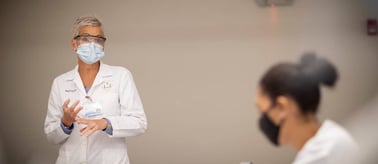Do More with Your Degree
Within your Health Science Electives options, you can choose combinations of courses that lead to credentials in EKG, phlebotomy, or as a medical administrative assistant.
EKG Technician
EKG stands for electrocardiogram. EKGs are recordings of electrical signals sent out by the heart. EKG technicians are healthcare professionals who administer non-invasive tests to assess the cardiovascular system of patients. The duties associated with EKG technicians include performing diagnostic tests on patients, blood pressure monitoring, patient preparation, appointment scheduling, and maintaining patient medical records.
Choosing HSC 1010 and EKG 1020 as two of your electives will prepare you for job placement in hospitals, physician offices, and more. Students study the anatomy and physiology of the heart, circulatory system, and conduction system in detail. The EKG, heart, circulation, and conduction must be covered with appropriate terminology and abbreviations with appropriate knowledge of equipment, proper lead placement, reading of EKG waves, arrhythmias and blocks, calculations, codes, and markings. Students learn by a combination of academic and practical application with a required completion of 10 EKG tracings in a laboratory setting.
Upon successful completion of the EKG technician course of study, students are eligible to sit for a national EKG certification exam.
Phlebotomy
Phlebotomists are professional clinical team members within the healthcare system whose primary responsibility is to procure blood and other specimens for diagnostic testing.
Choosing to take both PHL 1010 and PHL 1025 will prepare students for job placement in hospitals, physician offices, and more. Students are introduced to the clinical laboratory and phlebotomy with the exploration of how these areas contribute to the healthcare system, including: history of phlebotomy, hospital organization, legal and ethical concerns in healthcare, regulatory agencies and quality assurance, safety, infection control, and phlebotomy basics. Students learn by a combination of academic and practical applications and culminate their experience with a clinical practicum at a clinical affiliate.
Upon successful completion of the phlebotomy course of study, students are eligible to sit for the American Society of Clinical Pathology Phlebotomy Technician Certification Exam.
Medical Administrative Assistant
Students who choose to take HSC 2040, HSC 2045, and HSC 2060 will come away with the requisite knowledge and skills to perform in an area of administration. Medical administrative assistants play an important role in the patient's experience and are critical to medical offices and health care facilities. In addition to the required Health Science Professional courses, these 3 courses round out the domains of eligibility to take the exam to become a Certified Medical Administrative Assistant.
